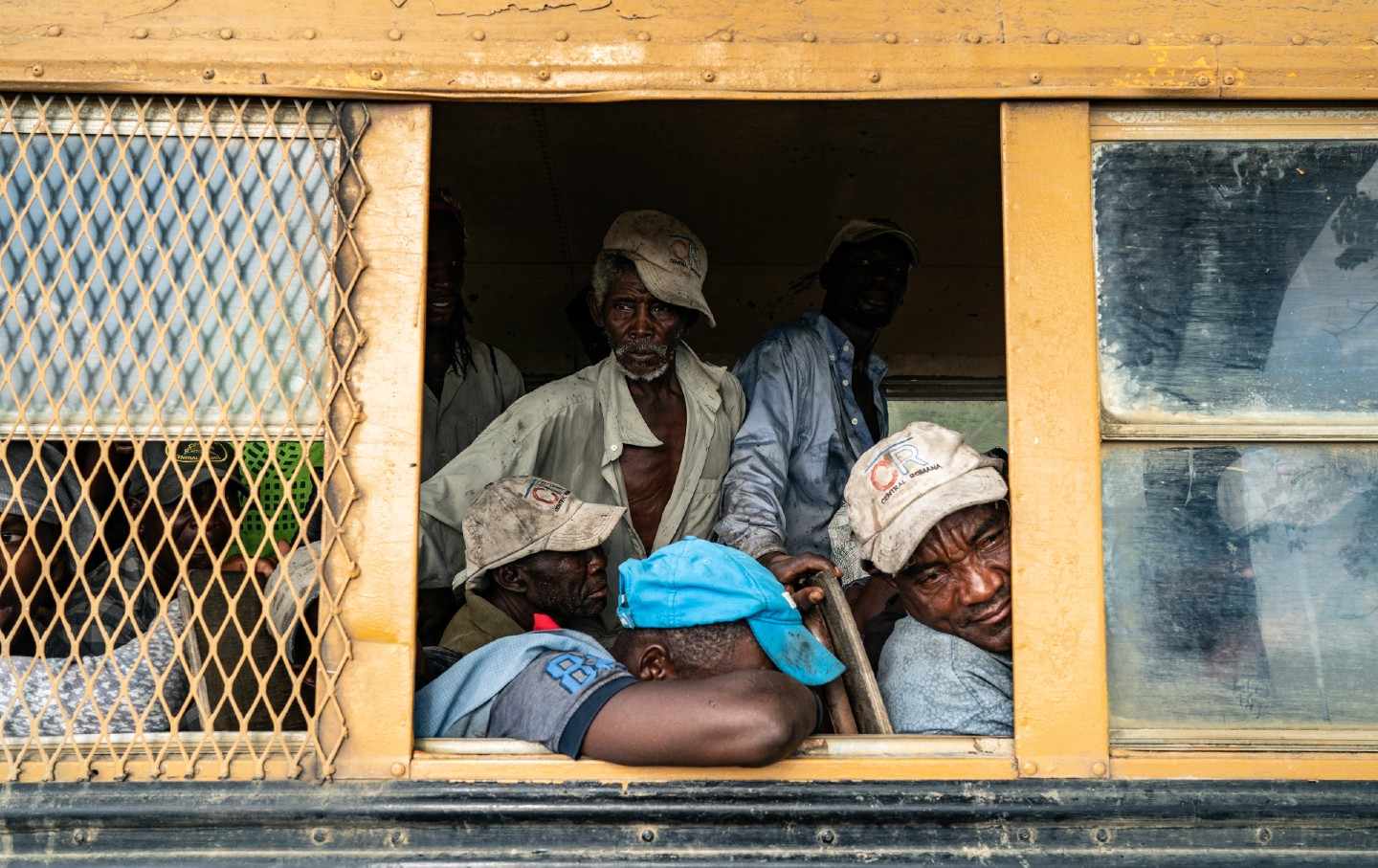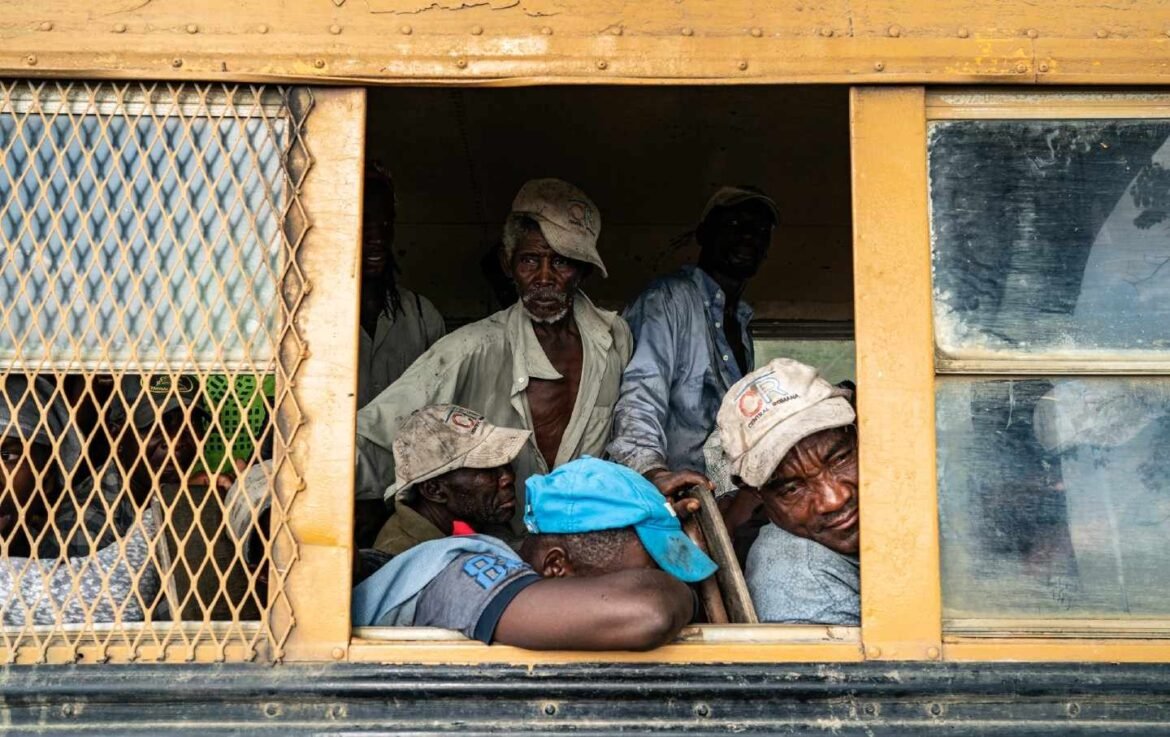April 16, 2025
A Trump-aligned company wins a pardon for labor violations in sugar production.

From the park closest to my home, I can see the former Domino Sugar factory in Brooklyn, where cane sugar from Florida and the Caribbean was refined for decades. Some of the cane refined there was grown on plantations in Cuba, the Dominican Republic, and Florida, owned by companies like the Central Romana Corporation. The Domino Sugar logo lights up brighter than ever each evening, but the factory is now a deluxe residential building where the penthouse condo costs $7 million and a one-bedroom apartment rents for over $6,200 per month. The building is a symbol of the transformation of an industrial area into a posh residential zone, the rebirth of the formerly working-class Williamsburg neighborhood as a gentrified hipster playground.
In 2022, the Biden administration placed an import ban on products from the Central Romana Corporation, based in the Dominican Republic, after advocacy by multiple nongovernmental organizations in the United States and the Dominican Republic concerning claims of labor abuses. A 2023 report from the US Department of Labor alleged the use of forced labor, a form of human trafficking, on Central Romana plantations. The report acknowledged some improvements since 2022 but concluded that they were insufficient to justify the lifting of the ban. Since the ban was first enacted, the company has spent millions on political donations and lobbying legislators to regain access to US markets, including a $1 million donation to a political action committee supporting Donald Trump’s 2024 presidential campaign and more than $400,000 in additional donations to the Republican National Committee. These efforts finally paid off. The New York Times reported on Wednesday, March 19, 2025, that the Trump administration had lifted sanctions banning imports from Central Romana.
Laborers working on sugar farms in the Dominican Republic such as Central Romana’s are predominantly of Haitian ancestry. Many lack any regular legal or social status in the Dominican Republic, even though many were born there or have worked on the sugar farms for many years.
Lack of regular immigration status and documentation renders these workers vulnerable to human trafficking. Most are uneducated and many are not even able to read their work contracts. They are housed in rudimentary and overcrowded shelters in isolated rural areas near the fields where they work, intimidated by the armed guards that patrol the fields. They are paid a pittance if they are paid at all; some are in debt to the company despite working extremely long hours. Nearly all those interviewed in December 2023 for the Department of Labor report said that they would leave if they could. Their situation has many of the typical hallmarks of human trafficking, including exploitation of the lack of legal status, debt, isolation, and threats.
Sugar production has long been associated with forced labor and human trafficking, both in the United States and elsewhere. Sugar was produced with slave labor in the Caribbean and the colonial states for use in the colonies and for export to the United Kingdom and elsewhere, fueling the slave trade. Emancipation did not bring an end to abuses in sugar production; in 1942, a woman named Viola Crosley wrote to first lady Eleanor Roosevelt describing how her son was forced to work without pay under guard in a forced labor camp on a sugar plantation in Clewiston, Florida:
I am a colored mother, and I need your help.
My boy answered an advertisement in our Post paper for a job as he was out of work and had myself and two younger boys depending on him. As it turned out they were sent to Clewiston Fla a month ago and he can’t get away or write. I am worried about him as I’ve talked to some white people and told them just how they are being treated, guarded at night by armed guards and not allowed to write home.
Won’t you please help me get my boy home?
There were many cases like Crosley’s from the 1860s until World War II. The federal government finally took action against forced labor not on moral principle, but because it needed to send these young men abroad to fight. The contradiction of sending African Americans drafted from communities ravaged by exploitation and labor abuses to fight “for freedom” was too glaring to be ignored.
Today, lifting the ban on imported sugar from Central Romana in the face of the findings of the Department of Labor report sets a dangerous precedent. US law forbids the import of goods made with forced labor, including child labor. The law forbids the import of cotton from Chinese work camps where Uyghurs are interned, and applies sanctions to people who benefit from forced labor in other sectors like cryptocurrency and other online scams. But if the Republican administration is now essentially accepting donations in exchange for tacit permission to use forced labor, including by children, other companies are likely to expect similar treatment. Political donations will be seen as purely transactional, an expedient to remove legal obstacles to using forced labor.
This decision by the Trump administration moves government away from regulations and the rule of law to a system ruled by whim and favors for donors, regardless of the consequences for people who work in horrifying conditions. In response, 30 organizations, including unions, and labor and human rights advocates, have signed a letter expressing dismay at the lifting of sanctions on Central Romana.
The decision demonstrates the administration’s disregard for both workers and US law. It forces us to ask whether working people on US soil could also be vulnerable to this type of corporate bribery. Changes to labor regulations could affect not just workers in other countries but in the United States as well. In another recent agriculture case, a trafficker in the state of Georgia was sentenced to a year and a day in prison and required to pay more than $300,000 in restitution to victims in “Operation Blooming Onion.” Would transactional donations prevent charges being brought in such cases in America? Could political donations lead to a pardon for the convicted trafficker?
These are not rhetorical questions. We live in a new Gilded Age, during which Republicans have proposed changes to labor law to allow children to work longer hours, to use heavy machinery, while the wealthiest give money to politicians and advocate against unions in the United States. Americans died fighting robber barons for the eight-hour workday, the five-day workweek, the abolition of child labor, and an end to hazardous and abusive workplace conditions. Every working person and everyone concerned with working conditions should act to prevent the undoing of any of these advances in the United States and elsewhere.
The chaos and cruelty of the Trump administration reaches new lows each week.
Trump’s catastrophic “Liberation Day” has wreaked havoc on the world economy and set up yet another constitutional crisis at home. Plainclothes officers continue to abduct university students off the streets. So-called “enemy aliens” are flown abroad to a mega prison against the orders of the courts. And Signalgate promises to be the first of many incompetence scandals that expose the brutal violence at the core of the American empire.
At a time when elite universities, powerful law firms, and influential media outlets are capitulating to Trump’s intimidation, The Nation is more determined than ever before to hold the powerful to account.
In just the last month, we’ve published reporting on how Trump outsources his mass deportation agenda to other countries, exposed the administration’s appeal to obscure laws to carry out its repressive agenda, and amplified the voices of brave student activists targeted by universities.
We also continue to tell the stories of those who fight back against Trump and Musk, whether on the streets in growing protest movements, in town halls across the country, or in critical state elections—like Wisconsin’s recent state Supreme Court race—that provide a model for resisting Trumpism and prove that Musk can’t buy our democracy.
This is the journalism that matters in 2025. But we can’t do this without you. As a reader-supported publication, we rely on the support of generous donors. Please, help make our essential independent journalism possible with a donation today.
In solidarity,
The Editors
The Nation

